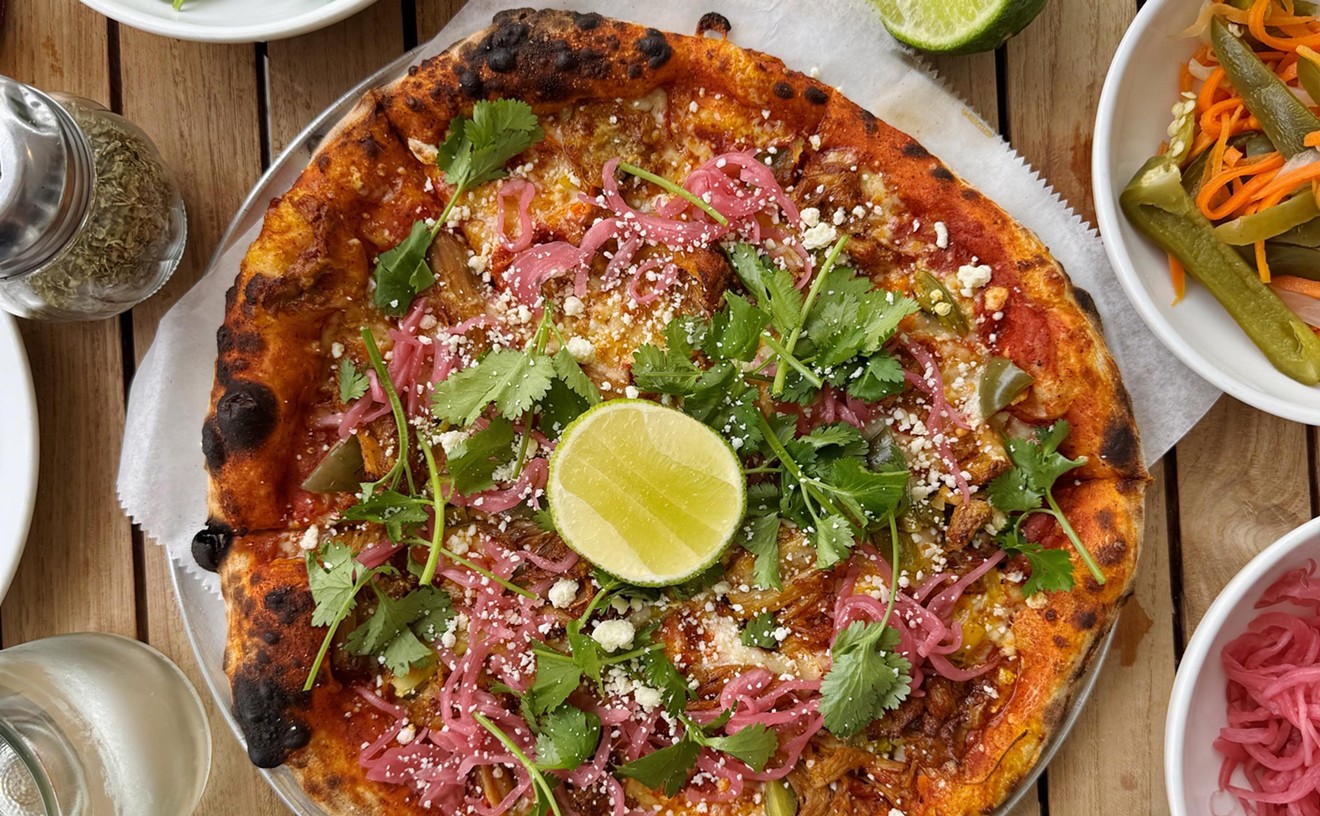On a warm morning in March, trash blows across a sidewalk in east Little Havana as a bus screeches to a halt in front of an empty restaurant. Its windows are too dark and dusty to see inside, but a banner near the roof offers signs of life: "Coming Soon: Raúl Galindo's Original Latin American." An old man slowly saunters through the crowd boarding the bus and up to the store. As he pushes open the door, Raúl Galindo breaks into song.
"Yo no sé nada," belts out the 75-year-old restaurateur, stylishly outfitted in a trim beard, hipsterish Ray-Ban glasses, plaid shirt, and tie. A book of Cuban poetry is tucked under his arm. "Yo llegué ahora mismo. Si algo pasó, yo no estaba allí." Galindo has good reason to sing: After half a decade of penury, he's finally back in business.
For more than 30 years, Galindo was king of the Cuban sandwich. Heaping stacks of ham, pork, and Swiss cheese brought him fame and fortune. He opened nearly a dozen eateries around Miami that at their peak raked in more $12 million a year. And his best-known joint, Latin American Cafeteria on 29th Avenue and Coral Way, became the symbolic heart of el exilio, a hub of Cuban politics where deals were struck.
"Everybody went there," remembers top chef and Miami native Douglas Rodriguez. "It was a show. You'd walk in and hear those guys tapping their blades on the cutting boards," he says. "They were sandwich maestros."
Like all empires, however, Galindo's eventually came crashing down. Over the past decade, he has lost everything to two messy divorces, scores of lawsuits, and a pair of hurricanes. The Coral Way restaurant is now an empty lot. Instead, dozens of what Galindo calls "impostors" have sprung up around town, using variations of his restaurant's name and sandwiches. But with younger business partners and a new location at SW First Street and 12th Avenue set to open this summer, Galindo is aiming for his old throne.
"The original Latin American is dead and buried," Galindo admits. "Now we have to dig it up with a pick and shovel and resurrect it."
But not everyone is wishing him well. His rivals fear he will win back business, and at least one ex-wife thinks the sweet-talking old Cuban still owes her money.
"It's a good thing that he's opening another restaurant," says Judith Espinosa. "At least my attorneys will have somewhere to go now."
Galindo was born near Havana in 1936, later moving to the capital to run his family's sandwich shop. But the young entrepreneur felt stifled by Castro's communist state, and he fled to Chicago at age 30. He worked nights in a Zenith TV set factory but indulged his true passion by bringing massive cubanos to work with him every evening, selling some and giving the rest away. "Some people fall in love with a woman," Galindo recalls. "I fell in love with sandwiches."
He moved to Miami in 1970 and found work as a cook at a Calle Ocho café. But the owners didn't know a thing about sandwiches, he says. "They were making them with boogers," he laughs. "It was disgusting."
Four years later, Galindo and his older brother, Luis, started Latin American Cafeteria on Coral Way. Unlike other joints, they served sandwiches made with fresh ingredients right in front of the customers. In fact, it was from behind the massive wooden chopping block that Galindo met his first wife, Madelaine Ferro, when the 17-year-old strolled into the restaurant looking for a job.
Business boomed as customers flocked to Latin American's meaty sandwiches. But Galindo still insisted on personally overseeing his ever-expanding sandwich empire. He took to sleeping at his restaurants rather than heading home to his young wife and two kids.
His obsession finally cost him his first marriage. When he tried to expand the spot on Coral Way, Ferro put her foot down. They argued about his plan to buy a neighboring building for almost $2 million, and Galindo moved out. Ferro filed for divorce in 1990, eventually winding up with their mansion in Coral Gables, two restaurants, several other properties, and $24,000 in monthly alimony.
"It was my fault," Galindo admits. "I was like a wandering ship captain, only instead of navigating the seas, I was navigating between all those restaurants."
But Galindo had business problems as well. His early success bred contempt among his competitors. Throughout the '80s and early '90s, dozens of Cuban sandwich joints popped up around Miami, often using the Latin American name and lettering. In 1993 alone, Galindo sued eight copycat restaurants, demanding they change their names. The tactic rarely worked. Galindo even fell out with his brother after cutting him out of the Coral Way restaurant. Luis responded by suing Raúl and opening two of his own sandwich shops before dying in 1996.
Just when his first divorce was finally settled in 2000, Galindo was watching a mystery on TV one night when he spied a woman half his age enter his restaurant. When he asked her what she wished to do in life, Judith Espinosa said she wanted nothing more than to be a housewife.
"I didn't see her as a woman, really, but as someone who could help me," Galindo recalls. They were married months later, but Galindo filed for divorce after less than a year. He now says he was betrayed by a close friend who set him up with Espinosa, only to have her suck him dry.
"She was totally in it for the money," Galindo says. "It was a disaster. She tried to control me completely. When I had a nervous breakdown and went to the hospital, she tried to take over my business by firing people and taking cash out of the registers."
During the 2002 divorce proceedings, Galindo claimed Espinosa routinely took thousands of dollars out of his three restaurants. She denied it, countering that she spent her own money trying to salvage the businesses and that Galindo dropped the divorce.
Instead, she was the one who divorced Galindo in 2006. Espinosa claimed he had been making $300,000 a month at each of his three remaining restaurants, kept six personal safes around town, and often spent lavishly on hotels and dinners with other women. "He had a severe gambling problem," she adds now.
By the time they divorced, Galindo's restaurants were already saddled with hundreds of thousand of dollars in unpaid debts, including a 2004 class-action lawsuit against the restaurateur for underpaying his employees. By 2007, Galindo didn't have the money to keep his lease on his last restaurant in Hialeah. It was demolished to make room for a high-rise, and the reign of the Cuban sandwich king was over.
"There was nothing left by that point," Espinosa says. "Nothing. And the land that was left, I had to sell to pay all of his bills, including liens for hundreds of thousands of dollars to vendors and the IRS." Indeed, records show Espinosa paid off dozens of claims on the Coral Way restaurant while staving off foreclosure. She finally sold the property, which had been leveled by Hurricanes Katrina and Wilma in 2005, for $1.6 million last year.
The divorce left Galindo with $30 and a 1997 Lincoln Town Car. Robert Quintero, one of Galindo's new business partners, says that when he first bumped into Galindo in a Little Havana pharmacy, the old man was staying with relatives and didn't have enough money to buy his own prescriptions.
"For a while there, he was on top of the mountain," says Alex Falmán, owner of Latin American Bayside Café, one of the restaurants Galindo sued in the early '90s over its name. "But he spread himself out too thin and started losing control of the restaurants, owing money to one vendor after another."
Galindo has a different explanation for his downfall. "Never divide what you have," he warns, referring to his two marriages. "Everything that is divided, falls. You let people in the door, and they tear the place down."
His problems aren't over yet, however. A recent restaurant venture fell apart when Espinosa, who won the rights to the name Latin American in the divorce, showed up, demanding a slice of the profits at Latin American Brickell in downtown Miami. The owners cut Galindo out rather than pay his ex-wife. Now Espinosa says she plans to go after Galindo's new restaurant in Little Havana.
Yet standing in the entryway of what he hopes is the first of a series of new restaurants, Galindo doesn't seem worried. Despite lingering financial trouble and a five-centimeter tear in his aorta that needs surgery, the bon vivant is still enjoying business just as much as when he made his first cubano half a century ago.
"Life is so rich," he says with a grin. "Every time you think you've tasted it all, you stumble across a new flavor."










